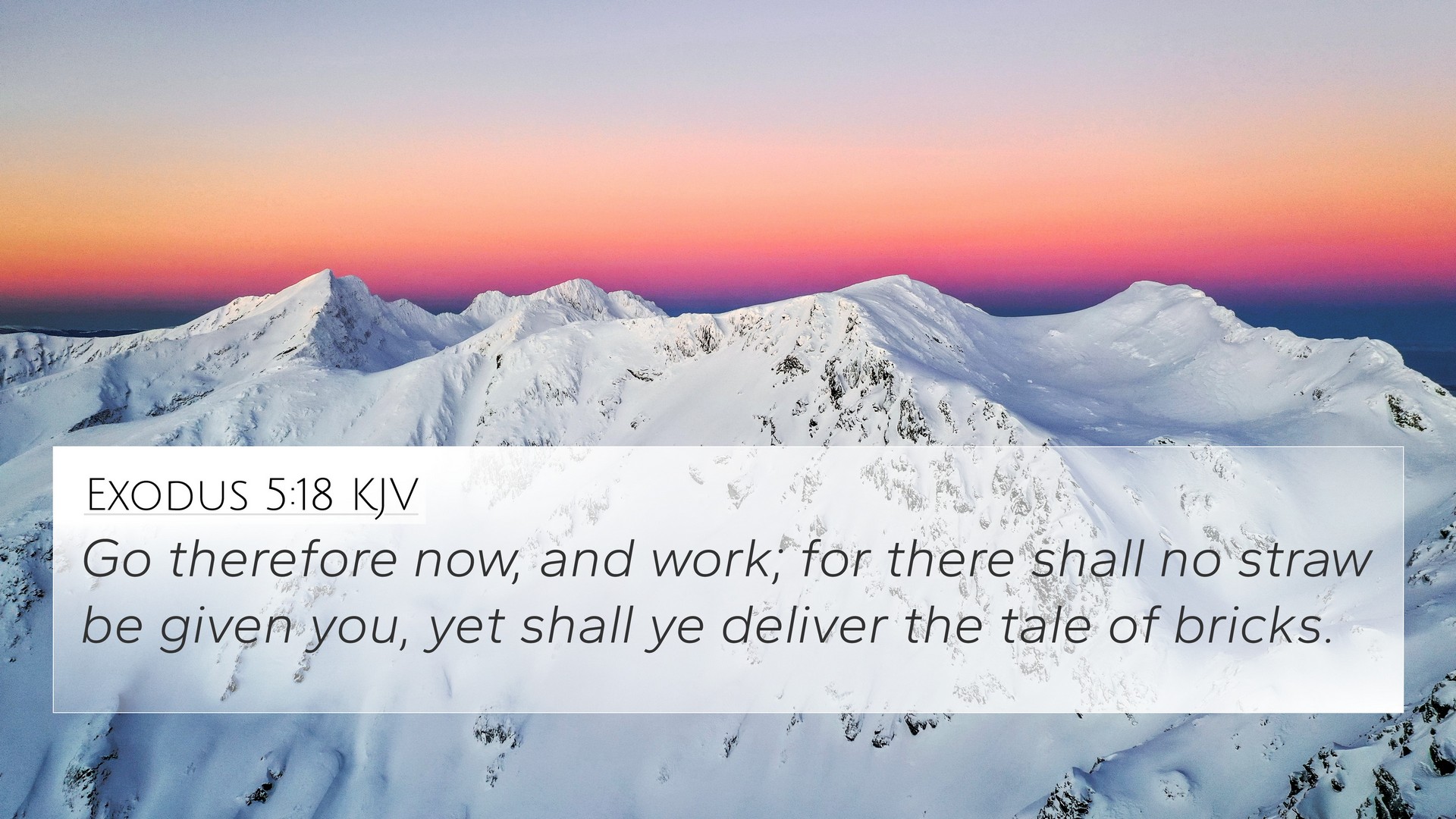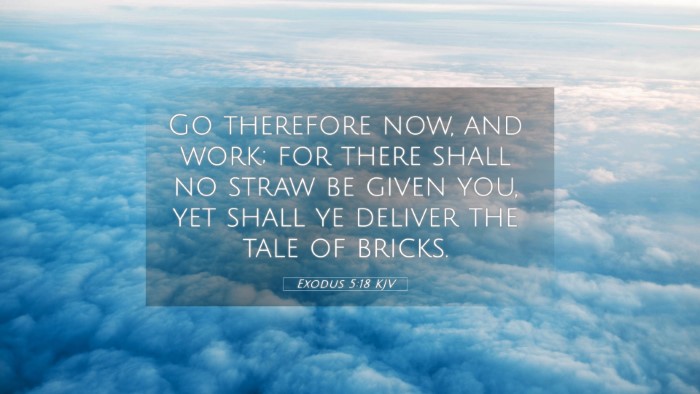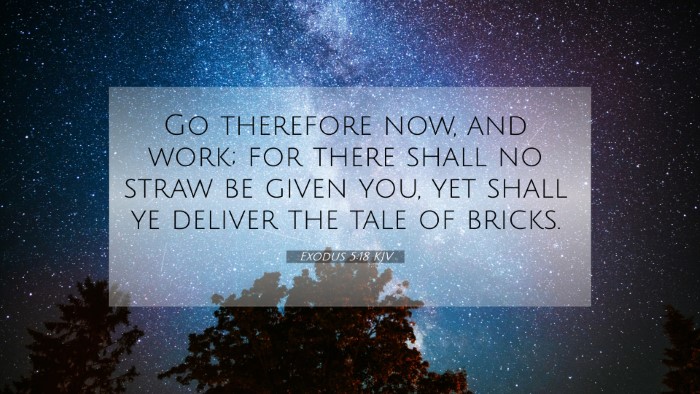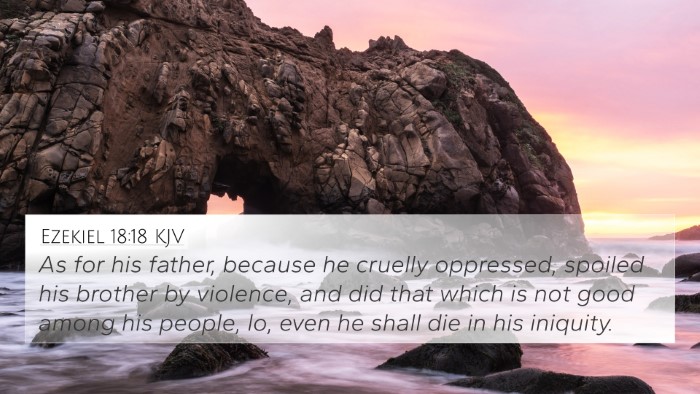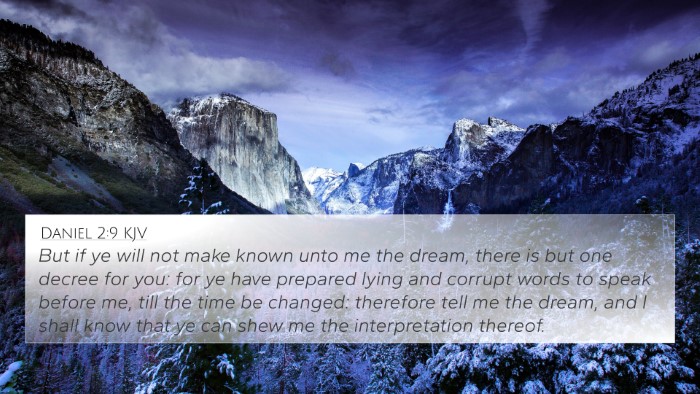Meaning and Interpretation of Exodus 5:18
Exodus 5:18 states, "Go therefore now, and work; for there shall no straw be given you, yet shall ye deliver the tale of bricks." This verse is part of the larger narrative concerning Moses' confrontation with Pharaoh regarding the liberation of the Israelites from Egyptian bondage. It reveals the increased burdens placed upon the Israelites following Moses' request for freedom.
Understanding Exodus 5:18 involves an analysis of key themes such as oppression, divine purpose, and perseverance under trial. The following combined insights from prominent public domain commentaries delve into these themes.
Insights from Public Domain Commentaries
-
Matthew Henry:
Henry emphasizes the harshness of the Egyptian taskmasters and the false hope instilled by Pharaoh’s initial response to Moses and Aaron. Instead of easing their burdens, Pharaoh intensifies their labor as a means to demonstrate his power and defiance of the Lord. This passage illustrates the futility of human efforts against divine will, as Pharaoh aims to crush the spirit of the Israelites by demanding greater output without providing necessary resources.
-
Albert Barnes:
Barnes provides a contextual analysis of this verse, noting that the command to work without straw exemplifies the cruelty and oppression faced by the Israelites. He highlights the significance of 'straw' in brick-making, which symbolizes the basic necessities that the Egyptians withheld from the Israelites. This added pressure serves as a metaphor for religious and spiritual oppression, challenging the faith of God’s people.
-
Adam Clarke:
Clarke explains that the increased labor imposed on the Israelites was an attempt to demonstrate Pharaoh's supremacy and to discourage any thoughts of liberation. The refusal to provide straw symbolizes the lack of compassion typical of oppressors. Clarke also draws parallels to the struggles faced by believers throughout history, reminding readers of the perseverance required in times of suffering.
Thematic Bible Verse Connections
Exodus 5:18 connects to several major biblical themes and other scriptures that reflect similar struggles and divine deliverance:
- Exodus 1:13-14: Describes the increased oppression faced by the Israelites under Egyptian rule.
- Psalm 105:25: Mentions how God turned the hearts of oppressors to hate his people, highlighting God's control over adversities.
- Romans 5:3-5: Encourages believers to rejoice in tribulations, for they produce perseverance and character.
- 1 Peter 5:10: Speaks to God's promise to restore those who endure suffering, aligning with the hope beyond current trials.
- Galatians 6:9: Advises not to lose heart in doing good, supporting the notion of perseverance against oppression.
- Matthew 5:10-12: Jesus’ teachings on the blessedness of those who are persecuted for righteousness’ sake echo the sentiments of enduring toil and oppression.
- Hebrews 11:25-26: Discusses the choice of Moses to suffer affliction with God's people rather than enjoy the fleeting pleasures of sin, reflecting the theme of choosing faith over comfort.
- Isaiah 30:20-21: Promises that God will not forsake His people even in times of oppression, reaffirming faith amid trials.
- 2 Corinthians 4:17: Highlights the transient nature of sufferings compared to the eternal weight of glory, encouraging believers to persevere like the Israelites.
Cross-Referencing Biblical Texts
This analysis demonstrates the utility of cross-referencing biblical texts to draw parallels and greater understanding of shared themes such as suffering and divine intervention. Through these connections, believers can find solidarity and encouragement in their struggles.
Using tools like a Bible concordance or a Bible cross-reference guide, individuals can explore these connections further. Engaging in cross-referencing Bible study methods deepens the understanding of scripture, enhancing one’s knowledge of God’s overarching narrative.
Conclusion
Exodus 5:18 serves not only as a historical account but also as a profound metaphor for the trials faced by those who seek to follow God's will amid oppression. The insights from public domain commentaries enhance our understanding and encourage a deeper exploration of interconnected scriptures.
For those seeking to understand the rich tapestry of biblical wisdom, the verse invites reflection on God’s faithfulness and the necessity of perseverance in the face of trials.
